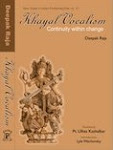I often discussed with Ustad Vilayat Khan the music of famous pre-independence musicians, whom I had not heard personally, but he would have certainly heard. In one of those conversations, the topic drifted towards early 20th century Rudra Veena music.
I had heard a few available recordings of Ustad Dabeer Khan, and thought his music was unrefined compared to the music of recent Beenkars like Ustad Zia Mohideen Dagar and Asad Ali Khan Saheb. Ustad Vilayat Khan chided me by saying – “Your ears have not matured enough yet to appreciate his music. Observe the “taseer” in his music.” I pleaded ignorance and asked him to explain. He said – “Taseer has no definition. When your ears are ready, you will experience it.” The enigma of “taseer” has intrigued me since then.
Taseer
is a Perso-Arabic abstract noun, derived from “Asar” = impact/ the
ability to elicit an emotional response. Music is, indeed, intended to elicit
an emotional response. So, Taseer can seem like a fairly routine reference to
respectable musicianship. In the
Hindustani music world, however, the attribution of “Taseer” is a rare honour,
bestowed on very few musicians – generally, not more than a handful in each
generation. The possession of “Taseer” is, it seems, the highest compliment a
musician can pay to another musician. This suggests that the term has come to
denote a quality, which words cannot describe, and strictly musical features
cannot explain.
During an interview given a few days before his demise, Ustad Hafiz Ali
Khan (Ustad Amjad Ali Khan's father), was asked about the
famed “Taseer” of his music, the Ustad said – “Taseer is from God. After one
has acquired learning (the taleem) diligently, and put in endless hard work,
one has to add prayer to it, offering one’s achievements to the Maker.Then, He
blesses him [the musician] with Taseer.” (The interview appeared in the
souvenir of the Hafiz Ali Khan Memorial Music Festival of 1975).
(c) Deepak S. Raja. December 2021








